berries: delicious, not, & poisonous
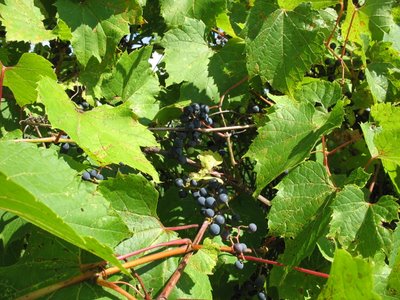 One of the types of wild grape growing here.
One of the types of wild grape growing here.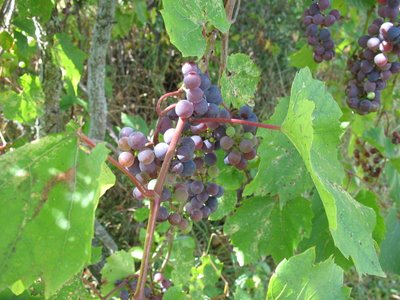 A tasty version of wild grapes along the laneway. This on almost reminds me of a table grape, juicy with small seeds. Most of the grapes are of the previous variety, very seedy with a sharp after-taste.
A tasty version of wild grapes along the laneway. This on almost reminds me of a table grape, juicy with small seeds. Most of the grapes are of the previous variety, very seedy with a sharp after-taste.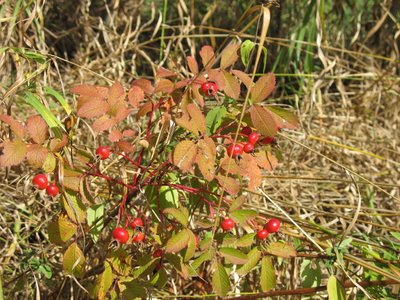 Rose hips on one of the wild roses along the laneway. As there seem to be several species of wild rose that grow here, I cannot say which one this might be.
Rose hips on one of the wild roses along the laneway. As there seem to be several species of wild rose that grow here, I cannot say which one this might be.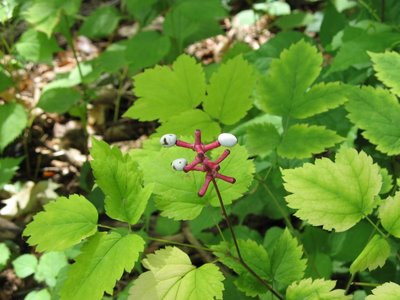 White Baneberry, Actaea pachypoda. Sometimes called "doll's eyes", the berries are very poisonous.
White Baneberry, Actaea pachypoda. Sometimes called "doll's eyes", the berries are very poisonous.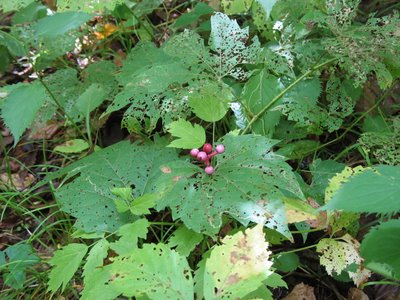 The red form of baneberry, Actaea rubra, here the berries oddly pink.
The red form of baneberry, Actaea rubra, here the berries oddly pink.Trying to upload a photo of Blue Cohosh fruit, I've given up in frustration. Blue Cohosh, Caulophyllum thalictroides, seed is reportedly used as a coffee substitute, but according to the Canadian Biodiversity Information Facility, the mature fruit and roots are poisonous.
Maybe it's my cynical nature, but I believe if most people are doing something -- like in our part of the world, the socially acceptable and official message is do not use herbal remedies -- that bears questioning. Most of the world actually still has to rely on home remedies and tradional ways of healing, where the knowledge has not been lost or suppressed as 'western' and 'modern scientific' ways are adopted willy-nilly. But I have to confess, I very, very rarely use any remedy, having a very healthy respect for the power of both herbs and conventional drugs to harm or heal. I tend to enjoy herbs in their mildest formulation: in teas for enjoyment and relaxation, and in cooking to add to the flavour to the foods!
I'm just as sceptical of herbal/ big-pharma preparations as I am of drug/pharmaceuticals! I think the best preparations are really fresh, local herbal preparations made by an herbalist who really knows their herbs and their actions on the body, keeping in mind that I think Mother Nature created herbs with an appropriate cloud of beneficial boosters and buffers built in. The best medicine of all is a good varied diet of the freshest foods possible!
All that aside, I learned to be quite specific about what part of wild plants are edible or not after reading the book Into the Wild, by Jon Krauker. The author's theory in this book is that this young man died, not because he was naive and unprepared for living in the wilderness of Alaska, as many thought, but because he relied on misinformation regarding the part of a wild plant that was edible vs the parts that were poisonous on the same plant!
Several herbal/ecclectic/alternative experts do use Blue Cohosh.
(*CAULOPHYLLUM (Blue Cohosh)Any uterine conditions characterized by asthenic, flaccid uterine muscles, with heavy, bearing-down sensations or cervicalUsually a tincture of the root, a few drops in a formula with other herbal derivatives is recommended. It might be most often used to ameliorate conditions such as amenorrhea, cervicitis, dysmenorrhea, endometritis, menopausal difficulties, uterine inflammation, delayed labour due to fatigue, a weak uterus or a history of inflammation of the uterus. A contraindication would be that it is an oxytocin synergist. Googling "N-methylcytisine", one of the toxic substances in Blue Cohosh, took me to this page at HerbMed.
venosities.RHIZOME / ROOT. Tincture [1:5, 60% alcohol] 5-20 drops, usually in
formula context.CONTRA: Pregnancy; sometimes useful in birthing but also very
unpredictable.)
It becomes pretty apparent, the more research that one does, that herbal remedies are quite complex. That should not dissuade one from using herbal remedies, however, any more than I would dissuade anyone from using a conventional pharmaceutical drug. Any powerful substance in large quantities, taken with substances that might enhance its effects, taken over a long period of time, or taken unbuffered by other compounds, if of course dangerous. That would be true of any "drug" as well.
It might seem too obvious to mention, but just as much consideration, knowledge and judgment(aka common sense!) should be invested in the decision to use or not use an herbal remedy as any conventional pharmaceutical preparation. Or should I say, the reverse is too true: too many people use conventional pharmaceutical preparations without due consideration, no knowledge of what a drug actually is meant to do, how it might do this and what the contraindications might be.
I'm not kidding! Recently, I encountered several women seriously addicted to Percocet. One of the women quite seriously said she didn't believe she was addicted because she couldn't believe that her doctor would have prescribed it to her if she could become addicted to it! Honestly! One of the women claimed she actually asked her doctor if it was addicting and he said no. Humph! Yeah, right! And to top it all off, these women were generously sharing their prescription drug with anybody who complained of the least little ache. "Here. Try my Percocet. I bet it will work for you....Ask your doctor to give you a prescription to Percocet." Did any of these women check to see what this drug actually is? is it a controlled drug? why is it controlled? And we worry about drunks on the road! As if these women weren't all driving under the influence.
When did we all sign an agreement to stop thinking, to allow someone else to do ALL our thinking for us? It seems we don't do anything these days without the authorization of "experts". Any MY! Aren't we upset when we get hurt after getting the 'ok from an expert' to do something stupid! Do we take no responsibility for ourselves anymore?
Again I return to my favorite quote from Michael Moore, an herbalist in the Southwest U.S.
I have developed the libertarian attitude that permeated 19th and early 20th
century pharmacy: 'Let them take what they want to...it's a Free Country. If
they don't know any better, let's thin the herd!'.
If only they wouldn't endanger others on their way to extinction.





0 Comments:
Post a Comment
<< Home